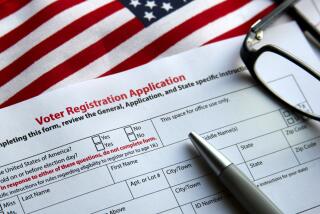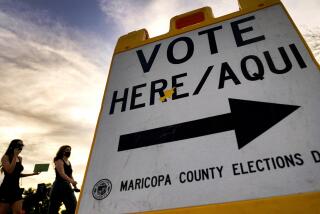House OKs Plan to Relax Rules on Voter Sign-Up
- Share via
WASHINGTON — Brushing aside White House opposition, a bipartisan coalition in the House on Tuesday approved a bill requiring states to allow adults to register to vote by mail, at public offices or when they get or renew driver’s licenses.
The measure, which would set up national registration standards and make vote fraud a federal crime for the first time, was passed by a vote of 289 to 132 and sent to the Senate for consideration.
Proponents said the so-called “motor-voter” bill would remove a major barrier to voting and sharply improve declining U.S. election turnout. It would go into effect in 1993.
“You talk about democratizing the world--it’s time to democratize us,” said Rep. Frank Annunzio (D-Ill.).
Opponents, however, argued that Congress was inviting ballot fraud and imposing high costs on the states by setting standards for how to put voters on the rolls or purge them. “My greatest concern is federal intrusion in the state and local election process,” said Rep. Pat Roberts (R-Kan.).
While President Bush has indicated that he would veto the bill, White House officials hope to persuade allies in the Senate to block the politically sensitive bill or modify it to meet Bush’s objections concerning possible fraud and added costs.
The legislation split the Republican leadership, however. Minority Leader Robert H. Michel (R-Ill.) led the fight against it, while his deputy, Republican Whip Newt Gingrich of Georgia, was a chief backer. The Democratic high command in the House warmly endorsed the measure.
On final passage, 228 Democrats and 61 Republicans voted in favor of the measure while 108 Republicans and 24 Democrats were against it.
A Michel substitute proposal to make the registration standards voluntary was rejected by a decisive margin of 291 to 129.
A Republican-led move to weaken the bill’s registration standards and stiffen enforcement provisions was rejected 265 to 156, indicating that a presidential veto might be sustained in the House.
Some observers said Republican opposition arose from the fear that the plan would mobilize more Democratic voters, especially women, minorities and the poor.
But Gingrich told his colleagues: “I don’t think you have anything to fear by encouraging registration.”
Al Swift (D-Wash.), the floor manager for the bill, termed it the most significant election reform since the Voting Rights Act of 1965, which imposed federal supervision over Southern states to make sure that blacks were allowed to register and vote.
Michel, however, said the bill would “greatly increase the potential for fraud” by allowing individuals to register by mail under several names. In traditionally Democratic Chicago, he said, a former U.S. attorney has estimated that 100,000 fraudulent votes were cast between 1982 and 1986. If the bill becomes law, he said: “We’ll really be taken to the cleaners.”
Supporters of the bill, however, said voter turnout in the 1988 election sank to a disappointing 50% of the electorate.
“Bring down the barriers and let more people pay their civic rent in the house of democracy and freedom,” argued House Democratic Whip William H. Gray III of Pennsylvania.
The legislation also would forbid states to remove any voter from its rolls for not voting. It would require that states verify registration lists by checking addresses or using the Postal Service’s change-of-address program to increase the accuracy of lists of eligible voters.
More to Read
Sign up for Essential California
The most important California stories and recommendations in your inbox every morning.
You may occasionally receive promotional content from the Los Angeles Times.










